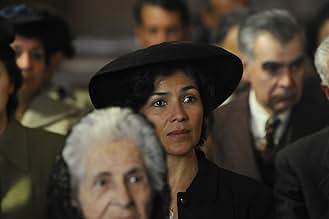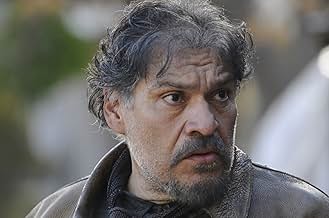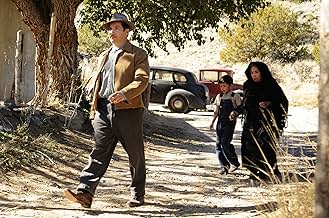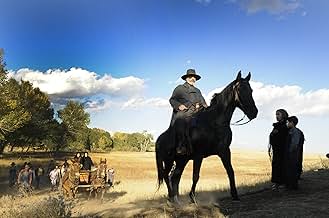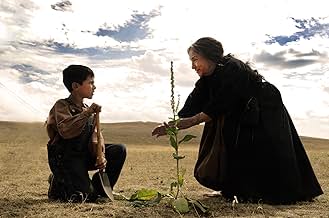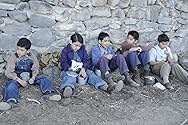CALIFICACIÓN DE IMDb
6.4/10
1.6 k
TU CALIFICACIÓN
Drama ambientado en Nuevo México durante la Segunda Guerra Mundial, centrado en la relación entre un joven y una anciana curandera que le ayuda a enfrentarse a la batalla entre el bien y el ... Leer todoDrama ambientado en Nuevo México durante la Segunda Guerra Mundial, centrado en la relación entre un joven y una anciana curandera que le ayuda a enfrentarse a la batalla entre el bien y el mal que arrasa su pueblo.Drama ambientado en Nuevo México durante la Segunda Guerra Mundial, centrado en la relación entre un joven y una anciana curandera que le ayuda a enfrentarse a la batalla entre el bien y el mal que arrasa su pueblo.
- Dirección
- Guionistas
- Elenco
- Premios
- 3 premios ganados en total
Miguel Gomez
- Eugene
- (as Miguel Gómez)
Alex Cacho
- Leon
- (as Alejandro Cabrera)
Diego Miró
- Florence
- (as Diego Miró-Rivera)
- Dirección
- Guionistas
- Todo el elenco y el equipo
- Producción, taquilla y más en IMDbPro
Opiniones destacadas
Having grown up in an environment similar to that which author Anaya describes and the movie attempts to portray, I was both elated and disappointed by the movie. Home base for me was the northern Rio Grande Valley, not the eastern N.M. *llanos* of Anaya's boyhood. I was about 7 years younger than 'tonio in the movie, so my experiences date from about 1951 forward. Things were still quite similar in N.M. back then to the earlier era that Anaya wrote about.
Of all the actors in the movie, the only one who came close to capturing a NM accent and cadence was 'tonio's father. All the others performed well, but to me they did not come across like born and bred New Mexicans. Actors pick up local accents and manners of speech all the time, but nearly all of the Hispanic actors in "Ultima" failed. It's like casting a native Baltimorean as a native of Maine--it stretches credibility. Both speak the language, but anyone from the northeast U.S. would hear the disconnect immediately.
"Bless Me Ultima" is a great story. Similar to Anaya'a family, we moved to Barelas in Albuquerque when I was in 7th grade. We rural New Mexicans of that era have all heard the *bruja* stories and are familiar with *curandera* practices. Ultimately those accounts were stories--told on late evenings when imaginations ran wild. Certainly the three sister witches in the movie added a sense of the spookiness and otherworldliness with which we all grew up, but that conceit only tangentially "gives readers a sense of the influence of indigenous cultural ways that are both authentic and distinct from the mainstream" as the book's entry in Wikipedia says.
Of all the actors in the movie, the only one who came close to capturing a NM accent and cadence was 'tonio's father. All the others performed well, but to me they did not come across like born and bred New Mexicans. Actors pick up local accents and manners of speech all the time, but nearly all of the Hispanic actors in "Ultima" failed. It's like casting a native Baltimorean as a native of Maine--it stretches credibility. Both speak the language, but anyone from the northeast U.S. would hear the disconnect immediately.
"Bless Me Ultima" is a great story. Similar to Anaya'a family, we moved to Barelas in Albuquerque when I was in 7th grade. We rural New Mexicans of that era have all heard the *bruja* stories and are familiar with *curandera* practices. Ultimately those accounts were stories--told on late evenings when imaginations ran wild. Certainly the three sister witches in the movie added a sense of the spookiness and otherworldliness with which we all grew up, but that conceit only tangentially "gives readers a sense of the influence of indigenous cultural ways that are both authentic and distinct from the mainstream" as the book's entry in Wikipedia says.
Ultima is a healer who uses herbs to cure the sick, and she is also called upon to heal a young man who has been cursed by three evil sisters. Her grandson, Antonio, narrates the story throughout, and so we hear an adult voice with the visual of a little boy learning about the meaning of life from Ultima. The acting is excellent; with the two leads really carrying the movie from start to finish. The scenery of New Mexico is beautiful. The First Holy Communion in a small church brought back memories of my Catholic childhood. The doubts of Antonio are well written by someone with a logical outlook on religion. At times the movie became a bit too sentimental for my taste, but I still found it entertaining and worth recommending.
Bless Me, Ultima Both the movie and the book expressed a wide view of different moods, details, and analysis. The book took the story one step at a time as the author, Rudolfo Anaya, progressively showed how the main character Antonio developed along with the conflicts of the novel. The book was good with a very detailed insight that made you feel as if you were a part of the book. The movie emphasized the major influences on Antonio as he becomes the age where you decide who and what you are going to be as an adult. The movie was pretty fast paced to fit the whole plot of the book into film, but it did not include the golden carp like it did in the book. This gave Antonio another religion to think about and I think this was very important to the book and the movie did not include it. Also, I like how the book goes into extreme detail to give you a perfect idea to how the story is meant to be portrayed. I liked to see each of the ways that Bless Me Ultima is expressed, but overall, the movie and the book was good.
A touching, unpretentious story told by a man who reminisces about growing up in a Mexican/American family during the years of WWII in New Mexico. The story focuses on the culture that surrounded such families during that time and depicts the strong bonds that tied them to the land, religion and each other. We are shown small glimpses of how even in their remote part the United States, the war had touched them by taking away their sons to defend our country. The storyline mainly surrounds the accounts of this grown up man (Antonio) as he narrates his view of the world as a child and the huge desire he had to understand everything around him. It depicts the very close bond he forms with a new member of their family and how this person shows him the beauty that life has to offer. This new member is named Ultima and she is a healer (curandera) who cures with herbs and "magic". Ultima is taken in by his parents due to her having nobody else in the late stages of her life.
The story shows the importance that religion played in the Mexican culture and how the taboo of the unknown was shunned by most. Ultima's ability to heal people was not always seen by others as good and the accusations of her being a witch are part of the drama within the story. The toil of daily life and the importance of everyone working together during harvest time reveals the close ties that existed between families at that time. Overall, it is a story that shows how people can get strength from their experiences and grow from the wonders that surround them. If we embrace life and everything that happens, both good and evil, we can have an existence with richer fullness.
The story shows the importance that religion played in the Mexican culture and how the taboo of the unknown was shunned by most. Ultima's ability to heal people was not always seen by others as good and the accusations of her being a witch are part of the drama within the story. The toil of daily life and the importance of everyone working together during harvest time reveals the close ties that existed between families at that time. Overall, it is a story that shows how people can get strength from their experiences and grow from the wonders that surround them. If we embrace life and everything that happens, both good and evil, we can have an existence with richer fullness.
Based on the 1972 novel by Rudolfo Anaya (a favorite among high school English teachers), "Bless Me, Ultima" is an autobiographical coming-of-age tale set in 1940s New Mexico. The story is narrated by a now-adult Antonio reflecting back on the events that happened to him and his family when he was a little boy. This includes the arrival of Ultima (Miriam Colon), a sort of cultural shaman, who has come to live out her final days with his family. Weather-beaten and leather-skinned, Ultima is filled with old person wisdom and the power to both heal and cast out evil spirits. It is the latter, in particular, that ends up causing trouble with some of the people in the village, who suspect her of being a "bruja."
Written and directed by Carl Franklin, "Bless Me, Ultima" is what "To Kill a Mockingbird" might have been like had Harper Lee seen fit to imbue it with generous touches of Magic Realism (in that version Boo Radley probably would have been an actual ghost). As befits the genre that also brought us "Like Water for Chocolate," "Bless Me, Ultima" comes replete with incantations, magic spells and a Significant Owl that passively observes all the human activity, then swoops in at keys moments of the story to make its presence felt. Antonio is surrounded by adults who are steeped in religious superstition, and he is forced to bear witness to some pretty horrendous actions arising from that fact. But he also learns from Ultima that, while evil may indeed exist in the world, one can overcome it by becoming one with nature and the spirits that inhabit it.
The structure of "Bless Me, Ultima" tends to be episodic and choppy, a situation that leaves a number of plot lines under-served and a number of characters (Antonio's older brothers, for instance) underdeveloped. On the other hand, the wide-eyed Luke Ganalon makes for an appealing and charming Antonio, and Benito Martinez ("The Shield," "Sons of Anarchy") scores as the dad who dreams of one day moving his family to California.
Despite all the supernatural and preternatural touches, "Bless Me, Ultima" feels overall pretty familiar as coming-of-age tales go, but the unusual setting and Ganalon's performance earn it a mild recommendation.
Written and directed by Carl Franklin, "Bless Me, Ultima" is what "To Kill a Mockingbird" might have been like had Harper Lee seen fit to imbue it with generous touches of Magic Realism (in that version Boo Radley probably would have been an actual ghost). As befits the genre that also brought us "Like Water for Chocolate," "Bless Me, Ultima" comes replete with incantations, magic spells and a Significant Owl that passively observes all the human activity, then swoops in at keys moments of the story to make its presence felt. Antonio is surrounded by adults who are steeped in religious superstition, and he is forced to bear witness to some pretty horrendous actions arising from that fact. But he also learns from Ultima that, while evil may indeed exist in the world, one can overcome it by becoming one with nature and the spirits that inhabit it.
The structure of "Bless Me, Ultima" tends to be episodic and choppy, a situation that leaves a number of plot lines under-served and a number of characters (Antonio's older brothers, for instance) underdeveloped. On the other hand, the wide-eyed Luke Ganalon makes for an appealing and charming Antonio, and Benito Martinez ("The Shield," "Sons of Anarchy") scores as the dad who dreams of one day moving his family to California.
Despite all the supernatural and preternatural touches, "Bless Me, Ultima" feels overall pretty familiar as coming-of-age tales go, but the unusual setting and Ganalon's performance earn it a mild recommendation.
¿Sabías que…?
- TriviaAuthor of the original novel Rudolfo Anaya was a frequent visitor to the set and was treated like royalty by cast and crew, because a majority of both were natives of New Mexico and grew up on the novel.
- ConexionesFeatured in Maltin on Movies: Jack the Giant Slayer (2013)
- Bandas sonorasMal Hombre
(uncredited)
Written by Lydia Mendoza
Performed by Lydia Mendoza
Published by San Antonio Music Publishers, Inc.
Selecciones populares
Inicia sesión para calificar y agrega a la lista de videos para obtener recomendaciones personalizadas
- How long is Bless Me, Ultima?Con tecnología de Alexa
Detalles
- Fecha de lanzamiento
- País de origen
- Sitios oficiales
- Idiomas
- También se conoce como
- Bendíceme, última
- Locaciones de filmación
- Productoras
- Ver más créditos de la compañía en IMDbPro
Taquilla
- Total en EE. UU. y Canadá
- USD 1,561,962
- Fin de semana de estreno en EE. UU. y Canadá
- USD 470,109
- 24 feb 2013
- Total a nivel mundial
- USD 1,561,962
Contribuir a esta página
Sugiere una edición o agrega el contenido que falta







